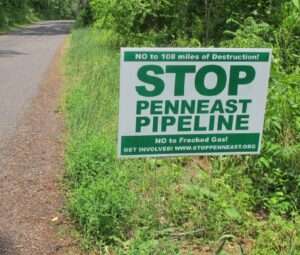The Volokh Conspiracy
Mostly law professors | Sometimes contrarian | Often libertarian | Always independent
PennEast Abandons Plans to Use Eminent Domain to Seize State-Owned Land in Case that Resulted in a Major Supreme Court Decision
The case was the subject of a Supreme Court ruling in which the power of eminent domain prevailed over state sovereign immunity.

Earlier this week, the PennEast Pipeline Company abandoned its plans to use eminent domain to take state-owned land in New Jersey for purposes of building a new interstate gas pipeline:
On Monday, September 20, the State of New Jersey submitted a letter to Third Circuit Court of the U.S. Court of Appeals stating it has reached an agreement in principle with the PennEast pipeline company that is seeking to abandon condemnation of 42 state lands for construction of an interstate gas pipeline. This announcement comes on the heels of PennEast taking the State of New Jersey all the way to the U.S. Supreme Court to defend its right to condemn these lands preserved by the state for public benefit.
"PennEast claims they aren't abandoning the project, but actions speak louder than words, and this move clearly suggests the polluting pipeline won't happen," said Tom Gilbert, campaign director, New Jersey Conservation Foundation and ReThink Energy NJ. "The news that PennEast won't move ahead with trying to condemn state lands to develop an unneeded fossil gas pipeline is a huge and welcome development. We applaud the Murphy Administration for successfully defending and preserving our public lands for future generations."
The planned condemnation was the subject of an important closely divided 5-4 Supreme Court decision issued in June, in which the federal government's power of eminent domain prevailed over state sovereign immunity, thereby empowering the federal government to delegate the power of eminent domain to private firms in situations where the latter want to use it to seize property owned by state governments.
While PennEast won the case in the Supreme Court, they appear to have lost the broader political struggle over the pipeline. It's possible they will yet find a way to go ahead with the pipeline without using eminent domain, or by condemning privately owned land. But the whole point of the effort to take state property was precisely that the company claimed there was no other practical way to complete the project.
Regardless of the fate of this particular project, the Supreme Court decision remains on the books, and the federal government can continue to use the power the ruling gives it. But, as PennEast learned, seizing property from hostile state governments is a tougher proposition than taking it from private owners. Most of the latter lack the political influence of the former, and they also usually don't have the resources for a prolonged legal and political battle of the kind New Jersey successfully waged in this case.
Politics aside, I still believe this was a terrible case that both sides deserved to lose. Both the majority opinion by Chief Justice John Roberts and the principal dissent by Amy Coney Barrett have very serious weaknesses. I went over many of them here.
Interestingly, the case cut across conventional ideological lines among the justices. The ruling divided both the liberal and conservative blocs on the Court. Conservative justices Samuel Alito and Brett Kavanaugh joined the Chief Justice's majority opinion, as did liberals Sonia Sotomayor and Stephen Breyer. Conservatives Clarence Thomas, Neil Gorsuch, and Amy Coney Barrett were all in dissent, joined by liberal Elena Kagan.


Show Comments (5)